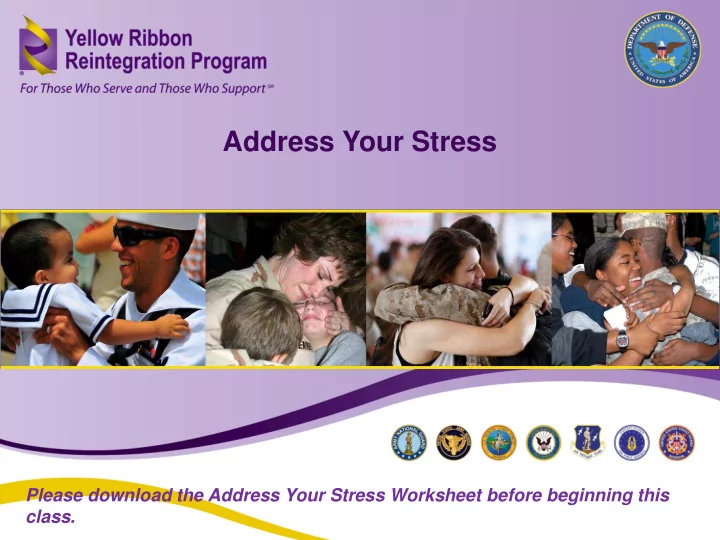

Address Your Stress Please download the Address Your Stress Worksheet before beginning this 1 class. Address Your Stress (JAN 2013)
Identifying Stress 1. What causes stress in your life? What makes you feel off balance? 2. How do you know you are stressed? 3. What do you do to cope/deal with stress? 2 Address Your Stress (JAN 2013)
Stress: the response we have when life challenges seem greater than our ability to handle them. Stressors: what causes stress. Can throw our body, mind, and emotions out of whack – disrupts our balance. Can be real or perceived. Address Your Stress (JAN 2013)
Real vs. Perceived Stressors Real changes occur in the body and mind due to real or perceived demands that disrupt our balance. “I can’t find my keys and I’m late” Real Perceived “My husband is 5 minutes late; what if he was in a bad car accident?” Do you see the difference? It is going to take time to find the keys causing me to be late. The husband could be late for any number of reasons. Maybe he can’t find his keys either! 4 Address Your Stress (JAN 2013)
Real vs. Perceived Stressors Examples 1. “My boss wants this report completed tomorrow. I have only 3 hours. There is no way to do it. ” 2. “I don’t think my mother-in-law likes me.” 3. “There is an official letter from the bank. What am I going to do? I must have overdrawn my checking account. ” 4. “I didn’t plan on the water heater breaking. How am I going to pay for it ?” 5. “The doctor hasn’t called. My test results must be negative.” 5 Address Your Stress (JAN 2013)
Some stress is actually good for us. Too much stress is a different matter. 6 Address Your Stress (JAN 2013)
“Bad” Stress Conditions To decide if the stress you’re feeling is too distressing or not, two conditions must be met: (1) you must feel that the stressor is threatening to your well-being (2) you don’t believe that you can deal with it 7 Address Your Stress (JAN 2013)
Cascade of Responses Address Your Stress (JAN 2013)
Stress Busting Strategies Journal about your stress and worry. Limit worry to a specific time of day. Postpone worry when you are busy. Tolerate and understand uncertainty. Focus on the present, all else is illusion. Do a physical activity. Talk to a friend. Slow down your breathing. Relax your body. 9 Address Your Stress (JAN 2013)
Relaxation Breathing Steps 1. Sit or lie down shoulders straight. 2. Relax the stomach. 3. Breathe in through the nose (See your stomach rise). 4. Breathe out through the nose (See your stomach fall). 5. Pause for a moment. Continue 15 – 20 minutes. 6. 10 Address Your Stress (JAN 2013)
Review of Key Points 1. Stress is both real and perceived. It still can disrupt our balance. 2. Stress has real impacts on bodily systems. 3. Practice coping strategies and relaxation techniques to help you manage stress. 4. You can relax the body using a stress management technique like relaxation or diaphragmatic breathing. 5. Some stress is good, but too much is a different story. If at any time you feel that stress is beyond your ability to cope, you should reach out for help. 6. There are many free useful resources for stress management. 11 Address Your Stress (JAN 2013)
Recommend
More recommend